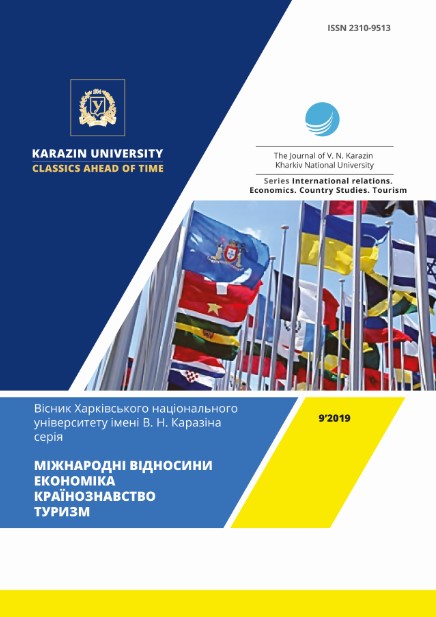Вплив політичної нестабільності на розвиток туризму в країнах Близького Сходу
Анотація
В статі розглядаються тенденції та проблеми розвитку туризму на Близькому Сході, проаналізовано туристичні ресурси країн регіону, тенденції розвитку в’їзного, виїзного та внутрішнього туризму в регіоні, категорії туристів, та основні проблеми розвитку туризму в регіоні. «Арабська весна» привела к стрімкому падінню популярності Близького Сходу як туристичного напрямку. Предметом дослідження статті є визначення основних проблем та дослідження впливу політичної нестабільності в країнах Близького Сходу на тенденції розвитку туризму в регіоні. Мета – визначення впливу політичної нестабільності на тенденції розвитку та формування туристичних потоків в країнах Близького Сходу. Завдання: дослідження основних проблем, що призвели до падіння популярності регіону, а також проблем що стримують розвиток туризму та загальний потенціал в країнах регіону. В ході дослідження використовувалися наступні загальнонаукові методи: системного аналізу за допомогою якого було розглянуто тенденції та проблеми розвитку туризму в країнах Близького Сходу; порівняльно-історичний метод за допомогою якого було досліджено вплив політичних подій на розвиток туризму в країнах регіону; статистичного аналізу для дослідження туристичних потоків в країнах регіону. Отримано такі результати: акти тероризму, війни та радикалізм деяких релігійних общин, привели к відтоку туристів, пошкодженню всесвітньо відомих історичних пам’яток та загибелі туристів, що в кінці кінців призвело до втрати регіоном його колишнього потенціалу. Висновки: на даний час основною проблемою, що стримує розвиток туризму на Близькому Сході є політична ситуація в регіоні, яка впливає не тільки на країни у яких війна але й на сусідні країні.
Завантаження
Посилання
UNWTO World Tourism Barometer. Available at: https://www.e-unwto.org/loi/wtobarometerrus
Shmytkova A. V., Chechyotenko YU. S. (2017) Vliyanie geopoliticheskoj obstanovki na razvitie turizma na blizhnem vostoke v XXI veke [The influence of the geopolitical situation on the development of tourism in the Middle East in the XXI century]. Available at: https://cyberleninka.ru/article/v/vliyanie-geopoliticheskoy-obstanovki-na-razvitie-turizma-na-blizhnem-vostoke-v-xxi-veke (in Russian)
Constanze Letsch ( 5 Oct. 2016 ): Turkey’s tourism industry reels from a year to forget. Available at: https://www.theguardian.com/travel/2016/oct/05/turkey-tourism-industry-reels-year-to-forget-istanbul-antalya
Dubai sees 15.8m visitors as it sets its sights on 20m. Available at: https://gulfnews.com/business/tourism/dubai-sees-158m-visitors-as-it-sets-its-sights-on-20m-1.2170183
Dubai Statistic Center , Visitor by Nationality – 2018. Available at: https://www.dsc.gov.ae/en-us/Themes/Pages/Tourism.aspx?Theme=30
Egypt: Country-specific: Arrivals of non-resident visitors at national borders, by nationality 2012 - 2016 (05.2017). Available at: https://www.e-unwto.org/action/doSearch?ConceptID=2271&target=topic
GÜNEŞ KÖMÜRCÜLER (February 09 2018) : It is now time for Turkey’s tourism sector to raise revenue. Available at: http://www.hurriyetdailynews.com/opinion/gunes-komurculer/it-is-now-time-for-turkeys-tourism-sector-to-raise-revenue-127034
Turkey TR: International Tourism: Expenditures. Available at: https://www.ceicdata.com/en/turkey/tourism-statistics
OPEC Share of World Crude Oil Reserves. Available at: https://www.opec.org/opec_web/en/data_graphs/330.htm
Автори, які публікуються у цьому журналі, погоджуються з наступними умовами:
- Автори залишають за собою право на авторство своєї роботи та передають журналу право першої публікації цієї роботи на умовах ліцензії Creative Commons Attribution License 4.0 International (CC BY 4.0), котра дозволяє іншим особам вільно розповсюджувати опубліковану роботу з обов'язковим посиланням на авторів оригінальної роботи та першу публікацію роботи у цьому журналі.
- Автори мають право укладати самостійні додаткові угоди щодо неексклюзивного розповсюдження роботи у тому вигляді, в якому вона була опублікована цим журналом (наприклад, розміщувати роботу в електронному сховищі установи або публікувати у складі монографії), за умови збереження посилання на першу публікацію роботи у цьому журналі.
- Політика журналу дозволяє і заохочує розміщення авторами в мережі Інтернет (наприклад, у сховищах установ або на особистих веб-сайтах) рукопису роботи, як до подання цього рукопису до редакції, так і під час його редакційного опрацювання, оскільки це сприяє виникненню продуктивної наукової дискусії та позитивно позначається на оперативності та динаміці цитування опублікованої роботи (див. The Effect of Open Access).




